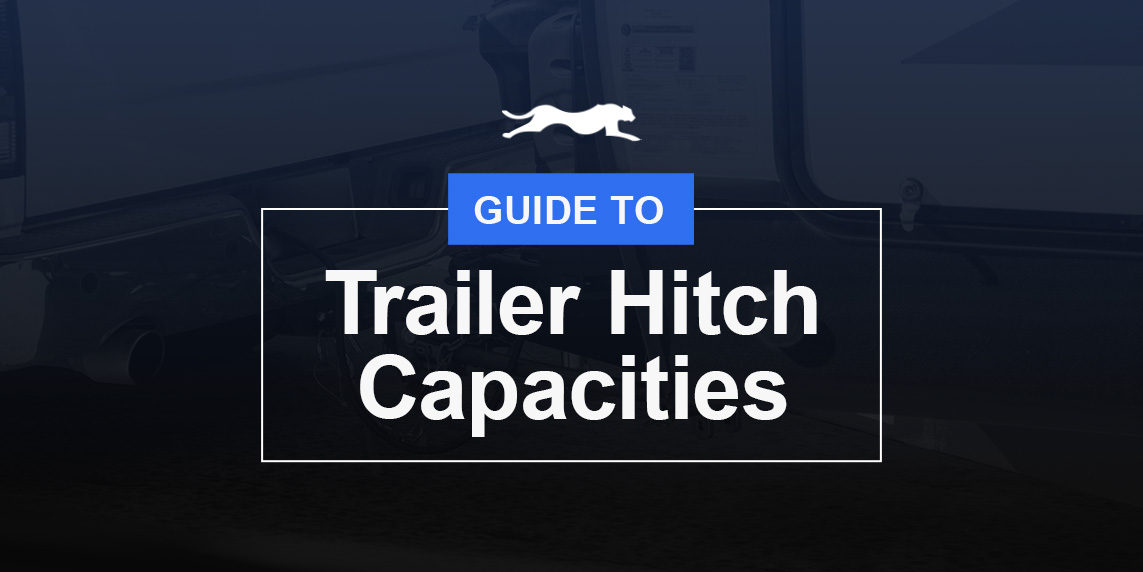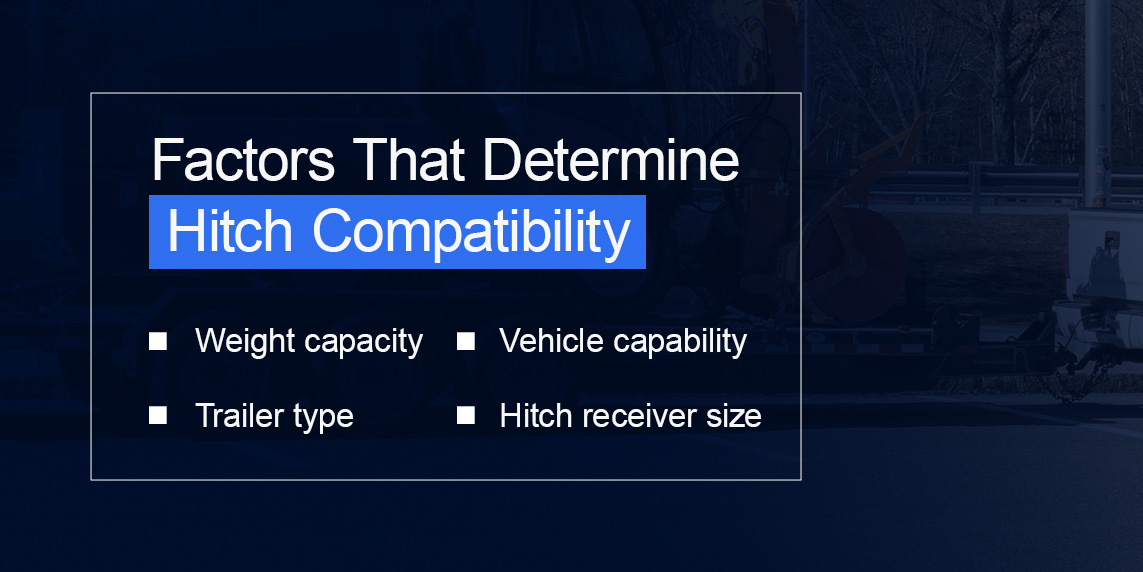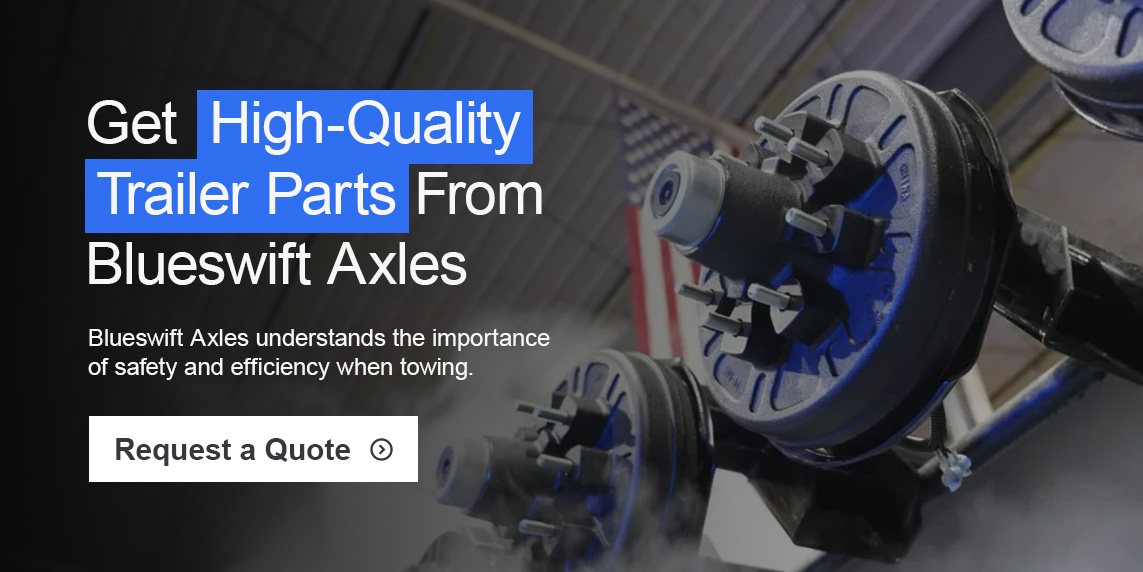Trailer hitches can vary greatly. Sorting through the different types, classes and weight limits can be overwhelming, but it’s important that you select the right hitch for your trailer. The proper hitch is critical to towing safety and performance because it supports the weight of the trailer and its load while withstanding road conditions.
Ensuring trailer hitch compatibility prevents issues like swaying or decoupling, allowing for safer towing conditions. This guide highlights the different hitch options and their capacities to help you make the right decision.
What Is a Trailer Hitch and Why Does It Matter?
A trailer hitch is a metal device that connects a trailer to a tow vehicle. To facilitate the connection, the hitch is attached to the rear frame of the tow vehicle using a hitch receiver. A ball mount or hook and loop mechanism is used to hook the trailer to the tow vehicle via the trailer’s coupler. Hitches ensure a reliable connection between your vehicle and the trailer. A proper hitch keeps the trailer firmly secure to the towing vehicle regardless of the terrain. Hitches are also critical to trailer stability, managing excessive swaying and preventing detachment.
Types of Trailer Hitches and Their Capabilities
There are various types of trailer hitches with different designs and weight capacities. Receiver hitches are grouped under various classes defined by gross trailer weight (GTW) to simplify selecting the correct hitch. Here are the different hitch types:
- Receiver hitches: These hitches attach directly to the tow vehicle’s frame. Receiver hitches include both ball hitches and pintle hitches. Depending on their capacity classes, they can handle much heavier loads.
- Gooseneck hitches: These are heavy-duty hitches that use ball mounts and couplers. They are designed for heavy towing and can hold up to 38,000 pounds. Gooseneck hitches are commonly found in truck beds.
- Fifth-wheel hitches: These are heavy-duty truck bed hitches similar to gooseneck hitches. The main difference between the two is that a gooseneck hitch connects to a ball in the truck bed, while a fifth-wheel hitch connects to a kingpin on the trailer and a plate in the truck bed. They can handle up to 30,000 pounds and are common with RVs and larger trailers.
- Bumper hitches: These are mounted on the vehicle’s bumper, making them less capable of heavy towing. They can handle light-duty towing tasks with a capacity of around 3,500 pounds. Bumper hitches are common in small trailers and can be found in SUVs.
While commonly called a hitch, a weight distribution hitch is actually an attachment that works with a receiver hitch to distribute weight evenly across the trailer and towing vehicle.
Here are the different receiver hitch classes and weight limits:
- Class I: Hitches with a 2,000-pound GTW capacity and are compatible with lightweight trailers and cargo carriers/racks.
- Class II: Hitches with a 3,500-pound capacity and can handle small trailers and campers.
- Class III: Hitches with an 8,000-pound capacity and compatible with utility trailers, medium trailers and boats.
- Class IV: Hitches with a 10,000-pound capacity and compatible with large boats, farm equipment and travel trailers.
- Class V: Hitches with 20,000-pound capacity and compatible with large trailers and construction equipment.
Trailer Hitch Comparison Table
| Hitch Type | Weight Capacity | Trailer Compatibility |
|---|---|---|
| Receiver | Varies by class, which ranges from 2,000 pounds to 20,000 pounds | Small to medium trailers (utility trailers, small campers, boat trailers) |
| Gooseneck | Up to 38,000 pounds | Large trailers, horse trailers and fifth-wheel RVs |
| 5th Wheel | Up to 30,000 pounds | Large trailers, horse trailers and fifth-wheel RVs |
| Bumper | Up to 3,500 pounds | Small trailers |
Factors That Determine Hitch Compatibility
Matching your trailer with the right hitch ensures safe and effective towing. These factors impact hitch and trailer compatibility:
- Weight capacity: GTW is the maximum weight of a trailer and its load. Tongue weight is the force at the hitch ball. These weight capacities are critical to the hitch you can use and impact the vehicle’s stability on the road.
- Trailer type: Different trailers have specific hitch needs. For example, a utility trailer is different from a horse trailer due to its lower weight. In addition, trailer hitches must also be compatible with the trailer’s coupler as they vary.
- Vehicle capability: You have different hitch options depending on the trailer’s weight and vehicle capability. You want a hitch that matches your vehicle’s tow rating and receiver set-up.
- Hitch receiver size: The size of the receiver determines the size of the accessories you attach, like a ball mount. The standard hitch sizes are 1.25 inches, 2 inches, 2.5 inches and 3 inches.
How to Ensure Your Hitch Is Compatible With Your Trailer
It’s one thing to ensure that your hitch can support the weight of the trailer and another to ensure it is compatible with your trailer. Here are factors that determine compatibility:
Hitch Type
Not all hitches are compatible with your trailer, even with the right weight capacity. Examples of hitch styles you might need include:
- Fifth-wheel hitches are ideal if you need to tow RVs and trailers that accommodate the truck bed hitching design.
- Drop hitches are suitable when you need to adjust the height of the trailer’s ride height.
- Pintle hitches are designed for large trailers with high-weight capacities and lunette ring couplers.
Ball and Shank Size
For a proper connection, the shank and ball must match the tow vehicle and trailer specifications. The hitch shank is the part that fits into the hitch receiver and holds the ball that connects with your trailer’s coupler. Hitch ball sizes range from 1 7/8 inches to 2 5/16 inches. Hitch shanks range from ¾ of an inch to 2 inches.
Getting the ball size right is important because it must match the size of your coupler opening. Most trailers have the ball size etched on the coupler head.
Coupler Variations
Your trailer’s coupler will determine the size and type of hitch that is compatible with it. Hitches vary and so do couplers, which ensures a perfect match. Selecting the correct coupler depends on trailer type, weight rating and tongue setup. Couplers also vary based on size and weight capacity. Common types include:
- Flat Plate
- Channel Mount
- Gooseneck
- Pintle hook and lunette rings
- A-frame
- Straight-tongue
How to Determine if Your Hitch Can Support Your Trailer
Using a hitch that supports your trailer’s weight is crucial to avoid issues such as swaying, excess trailer noises and detachment. How do you choose the right trailer hitch? Here are three key steps:
- Confirm hitch class: Receiver hitches come in five classes with varying towing capacities and receiver tube sizes. Depending on your trailer and cargo weight, select a hitch with a matching GTW.
- Measure weight capacity: Pull your loaded trailer on a vehicle scale or use a trailer weight scale to determine GTW. You can use a tongue weight scale to measure TW. This helps you avoid exceeding trailer hitch weight capacity.
- Consult towing guide: Confirm your vehicle’s towing guide to select a proper hitch for your vehicle’s capacity. This is important because you should never haul more weight than your vehicle can handle.
What Are the Risks of Using the Wrong Hitch?
Can a hitch tow any trailer? No, a single hitch can’t tow every trailer type. If you choose the wrong hitch for your trailer, you risk issues such as:
- Overloading the hitch: Excess weight on the hitch could lead to hitch failure. Your hitch may break, damage the tow vehicle or detach from the trailer.
- Trailer detachment: A mismatched hitch and trailer coupler result in a loose connection, increasing the risk of detachment.
- Improper weight distribution: Excessive weight on the hitch could result in poor weight distribution and can cause swaying, handling issues and accidents.
- Structural damage and wear: An improper or overloaded hitch strains your vehicle, causing structural damage over time.
- Legal issues: Accidents caused by hitch mismatches may result in legal issues.
Upgrading or Adjusting for Specific Trailer Needs
It’s important to balance trailer weight and hitch capacity. Here is how to ensure your hitch meets specific trailer needs.
- Try weight distribution: Weight distribution systems spread the tongue weight evenly across all the axles, allowing you to tow larger trailers and heavier loads with improved stability, handling and braking power.
- Upgrade your hitch: If you have a new tow vehicle, a bigger trailer or are towing more loads, it’s best to upgrade your hitch to match your current trailer needs.
- Use an adjustable hitch: To accommodate the differences between trailer types and sizes, you may need an adjustable hitch.
- Consult an expert: If you’re unsure what changes to make to meet your trailer needs, consult a professional to ensure safe towing.
Additional Safety Tips for Towing With the Right Hitch
Towing your trailer with the right hitch is vital for your safety and the safety of other road users. One way to promote safety is to learn about the different trailer brakes and select the most reliable, especially when towing heavier loads. You also want to prioritize routine hitch inspections. Before every use, detach your hitch from the tow vehicle and check for signs of wear, rust or damage. If you’re unsure about correct attachment techniques, have a professional show you how to correctly secure the hitch, coupler and safety chains.
Get High-Quality Trailer Parts From Blueswift Axles
Towing demands the right equipment to ensure safety for you and other motorists. In addition to safety, selecting the correct hitch for your trailer promotes efficiency through improved strength, stability and control. While navigating hitch and trailer compatibility can be daunting, learning how your trailer works will save you from issues when towing.
Blueswift Axles understands the importance of safety and efficiency when towing. That’s why we specialize in custom trailer axles and high-quality trailer components that you can rely on. Shop for axles and other trailer parts, or browse our blog to learn more about trailer solutions!


